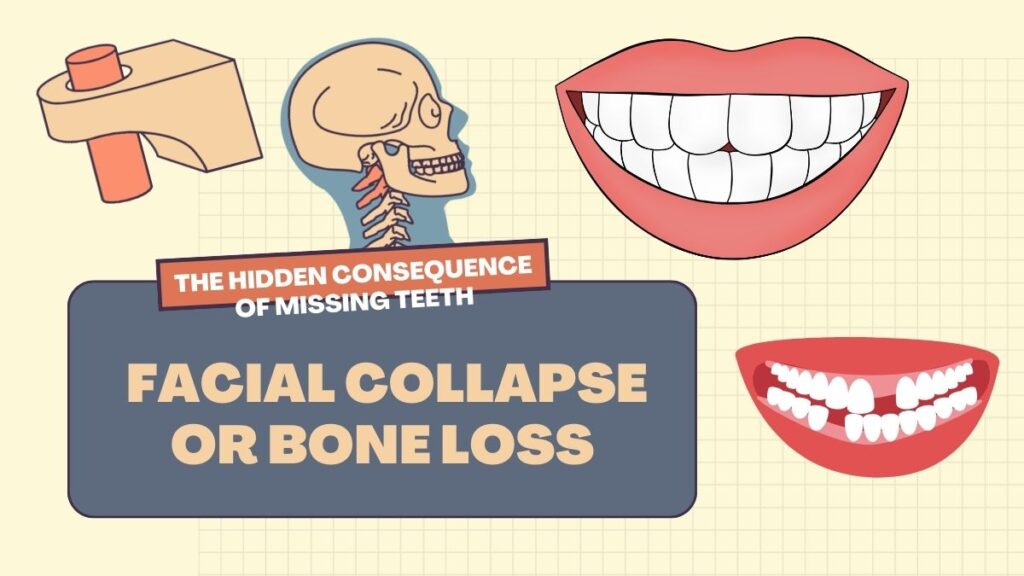8 signs you need dental implants Dental implants are one of the modern advances in cutting-edge dentistry. If you’ve ever faked your smile, experienced good pain when chewing or struggled with missing or damaged teeth, dental implants could be the answer you’ve been waiting for but how do you know when you need dental implants? Here are some signs that it’s time to take up this treatment. In this issue, we will dive deeper into the eight signs that you need dental implants and help you understand why they might be right for you.
1. Tooth Loss: The Most Obvious Sign
- 1. Tooth Loss: The Most Obvious Sign
- 2. Cracked or Broken Teeth Beyond Repair
- 3. Shifting Teeth: The Domino Effect
- 4. Difficulty Chewing or Eating: When Eating Becomes a Struggle
- 5. Wearing Dentures Is Inconvenient or Uncomfortable: The Struggles of Dentures
- 6. Facial Collapse or Bone Loss: The Hidden Consequence of Missing Teeth
- 7. Low Self-Confidence Due to Missing Teeth: A Smile That Matters
- 8. Gum Recession or Severe Gum Disease: When Gums Are Not Healthy
- Conclusion: Is It Time for Dental Implants?
- FAQ'S : SECTION
Tooth loss is not just an aesthetic concern; it affects your overall dental health and well-being. Missing teeth can impact your ability to chew properly, which can lead to digestive issues. It also affects how you speak and can cause your remaining teeth to shift out of place.
Why Dental Implants Are the Solution
A dental implant acts as a replacement for the missing tooth root and provides a strong foundation for artificial teeth. Unlike dentures or bridges, dental implants are permanent, allowing you to enjoy life without worrying about gaps in your smile. Dental implants look and function just like natural teeth, so you can smile with confidence once again.
Example Anecdote:
Samantha, a 45-year-old teacher, had struggled with missing teeth for years. She had been avoiding social events because of her appearance, and eating certain foods had become a challenge. After talking to her dentist, she decided to opt for dental implants. Today, Samantha enjoys eating all her favorite foods and feels much more confident in her smile.
2. Cracked or Broken Teeth Beyond Repair
Have you had an accident or simply noticed that your teeth have become cracked or broken over time? If these cracks or breaks go beyond what a filling or crown can fix, it’s time to consider dental implants. Damaged teeth that can’t be repaired through traditional methods may need to be extracted.
Dental Implants: A Lasting Solution
Unlike fillings or crowns, dental implants replace the entire tooth, including the root. This provides a stronger and longer-lasting solution compared to other methods. The implant fuses with the jawbone, giving you a tooth that is as strong as a natural one.
Example Anecdote:
John, an avid cyclist, had an accident that caused him to break several of his teeth. While his dentist tried to repair them with crowns, they simply didn’t hold up. John turned to dental implants for a permanent solution, and now he enjoys his active lifestyle without worry.
3. Shifting Teeth: The Domino Effect
When you lose a tooth, the surrounding teeth may begin to shift to fill the gap. This can lead to misalignment, which may not only affect your smile but can also cause bite problems, making eating more difficult.
How Dental Implants Help
Dental implants prevent the transferring of your last teeth via filling the gap where the misplaced tooth as soon as changed into. By restoring the natural alignment of your enamel, dental implants help maintain the form of your face and your bite, making sure that you could chew and communicate without problems.
Example Anecdote:
When Maria lost her returned enamel, she noticed that her tooth commenced to shift. Over time, her chunk became misaligned, causing soreness. Her dentist endorsed dental implants, and after the process, her teeth have been back to their natural role, and he or she has not experienced soreness.
4. Difficulty Chewing or Eating: When Eating Becomes a Struggle

If you find yourself avoiding certain foods because chewing has become difficult or painful, this is another clear sign that you need dental implants. Missing or damaged teeth can cause discomfort while eating, leading to poor nutrition or an unhealthy diet.
The Power of Dental Implants
Dental implants restore your ability to chew comfortably, allowing you to enjoy a full range of foods without pain. They also help preserve your jawbone by providing the necessary stimulation for bone growth, preventing further complications down the line.
Example Anecdote:
Timothy loved eating apples but had lost a few teeth due to gum disease. He couldn’t enjoy his favorite fruits anymore. After getting dental implants, Timothy regained the ability to chew normally and, as a result, added apples back to his diet.
5. Wearing Dentures Is Inconvenient or Uncomfortable: The Struggles of Dentures
Dentures may have been a solution in the past, but if you’re tired of the discomfort they bring—whether it’s the slipping, the adhesive, or the constant need for adjustment—dental implants could offer you a better option.
Why Choose Dental Implants Over Dentures?
Unlike dentures, which can shift and feel unnatural, dental implants are permanently anchored in your jaw. There’s no need for adhesive, and they won’t slip while eating or speaking. Dental implants are designed to feel and look just like natural teeth, providing you with both comfort and confidence.
Example Anecdote:
Patricia had worn dentures for years but was constantly frustrated by the slipping and discomfort they caused. After hearing about dental implants, she made the decision to try them. Now, she enjoys eating and speaking without worrying about her teeth moving out of place.
6. Facial Collapse or Bone Loss: The Hidden Consequence of Missing Teeth

When you lose a tooth, the bone underneath begins to deteriorate because it no longer has a tooth root to stimulate it. This can lead to facial collapse or a sunken appearance, making you look older than you are.
How Dental Implants Prevent Bone Loss
Dental implants are the only solution that helps prevent bone loss. The implant post fuses with your jawbone, stimulating it and helping to maintain its strength and shape. By preserving your jawbone, dental implants not only restore your smile but also your facial appearance.
Example Anecdote:
Lily was concerned about her sunken facial appearance after losing several teeth. Her dentist suggested dental implants to preserve her bone structure, and after the procedure, she noticed that her face looked fuller and more youthful.
7. Low Self-Confidence Due to Missing Teeth: A Smile That Matters
One of the biggest impacts of missing teeth is how it affects your self-esteem. If you’re hiding your smile or avoiding social situations because of gaps in your teeth, dental implants can help restore your confidence.
The Confidence Boost of Dental Implants
When you have a full set of teeth, you feel more confident about your appearance. Dental implants are custom-designed to match your natural teeth, ensuring that they blend seamlessly with your smile. Whether you’re smiling for a photo or engaging in a conversation, you’ll feel great about how you look.
Example Anecdote:
After losing her front teeth, Lucy avoided smiling in public. She was self-conscious about her appearance and missed being able to smile freely. After receiving dental implants, Lucy regained her confidence and now smiles without hesitation.
8. Gum Recession or Severe Gum Disease: When Gums Are Not Healthy
Gum disease can lead to gum recession and ultimately tooth loss. If you’ve experienced severe gum disease that has caused your teeth to loosen or even fall out, dental implants are a great option to restore both function and appearance.
Restoring Health with Dental Implants
Dental implants are placed directly into your jawbone, bypassing the gum tissue. This makes them a viable option for individuals who have experienced gum recession or disease. Additionally, working with a periodontist ensures that your gums are healthy enough to support the implants.
Example Anecdote:
David had severe gum disease that led to the loss of several teeth. His dentist recommended dental implants as part of a comprehensive treatment plan to restore both his gum health and his smile. With the help of dental implants, David’s smile is back to its former glory.
Conclusion: Is It Time for Dental Implants?
If you’re experiencing any of the signs listed above, dental implants may be the perfect solution for you. Not only do they restore the function and appearance of your teeth, but they also offer long-term benefits that other dental solutions simply can’t match.
Step-by-Step Guide to Getting Dental Implants:
- Consult a Dentist: Start with a consultation with a dental professional to evaluate your oral health. Learn more about this step on the American Dental Association’s website.
- Imaging and Assessment: Your dentist will use X-rays to assess the health of your jawbone and plan the implant placement.
- Placement of Implants: The dental implant post is surgically placed into your jawbone.
- Healing Period: Allow time for the implant to fuse with the bone (osseointegration).
- Placement of Restoration: Once healed, a crown or bridge will be placed on top of the implant.
- Aftercare: Follow up with your dentist to ensure proper healing and function.
Dental implants are a safe, long-lasting, and highly effective solution for many dental issues. They can restore your smile, boost your confidence, and improve your quality of life.
FAQ’S : SECTION
OTHER REALTED BLOGS ARE :

